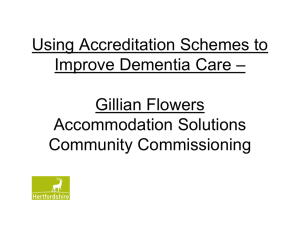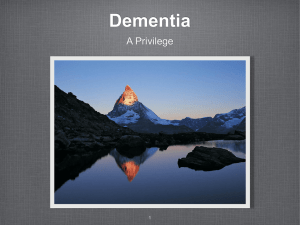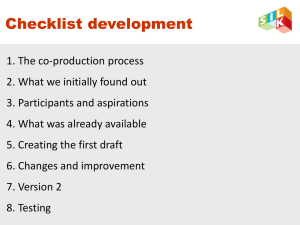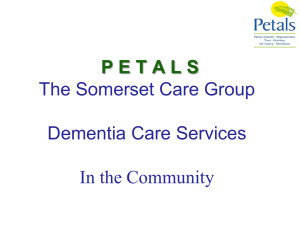Presentation (Powerpoint)
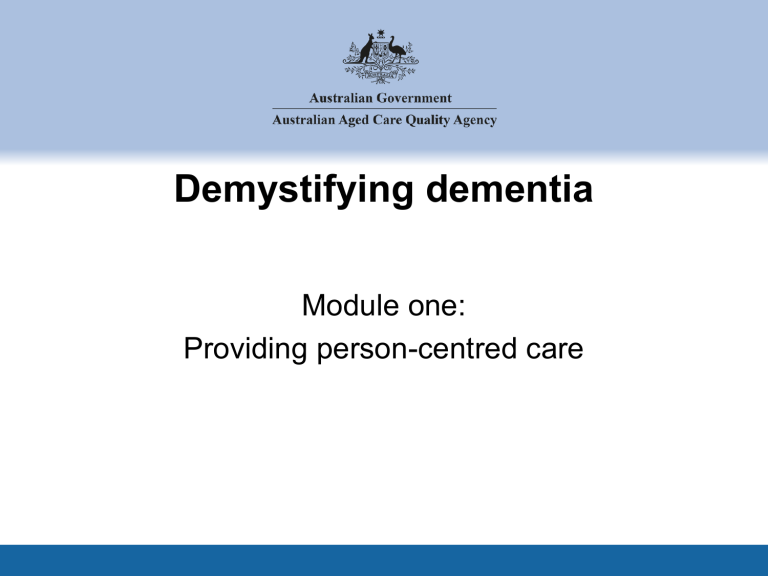
Demystifying dementia
Module one:
Providing person-centred care
This module covers:
1.1 Providing individual care for people with dementia
1.2
Focusing on the individual not the illness in the context of relationships and family
1.3
The impact of the physical, social and emotional environment
Learning outcomes
At the end of this module you will be able to:
• Define and explain person-centred care
• Describe the impact of dementia on a person, their family and significant others
• Identify the impact dementia can have in terms of assisting a person with dementia
• Describe the feelings and needs of a person with dementia
• Describe the factors in the environment that can impact on a person with dementia
3
What is it like to have dementia?
From “Opening Shutters – Opening Minds” by James McKillop
3
Providing individual care
Encouraging positive social interaction
(relationships) in care by working with the person with dementia , their families , our care workers and our care environments
(physical and social).
4
Best practice
The person
Relationships
The family
Philosophy of care
The environment
The staff
5
What is a Philosophy of Care?
Definition:
The core values an organisation uses in delivering their services. Your organisation has values which you and the organisation agree are important or of value in the workplace
Core values = Philosophy of Care or Mission
Statement
Actions are greater than words!
6
6
Examine your organisation's philosophy or mission
• Is it clearly defined?
• Does it help staff work effectively together?
• Does it have the support of Management?
• Does it help you in your daily work?
• Is it alive in your service?
7
What are the benefits?
• A guideline to help with decision-making
• A tool to allow people and the service to all move in the same direction
• Must be alive in the workplace
Unites everyone (care workers, clients and family carers) in a common purpose!
8
1.2 Focus on the individual not the disease
• In the context of relationships and family
• Improve the quality of life for people with dementia
• Try to understand people with dementia and what matters to them
• Appreciate the uniqueness and individuality of each person with dementia
9
C
entre
A
ccept
R
espect
E
nable
An individual or person centred approach
10
Centre
The better we know the person behind the illness the more likely it is that we will treat them as an individual .
Explore a person’s Background
• Abilities
• Culture
• Relationships
• Health
• Likes and dislikes
• Disabilities
11
Accept
• Do not take what people with dementia people say or do personally - it is the illness that is the problem
• What works for one person may not work for another person. There are no magical solutions
• Spend time to save time
12
Respect
• Instead of seeing the illness as dominating the person we see the person first and the illness second
• Understand and respect the individual and what they value
• Support participation, choice and independence
• Maintain dignity
13
Enable
Through our caring relationship and physical and social environment you:
• Maintain skills, abilities, dignity and self esteem
• Provide opportunities for the individual’s growth.
• Maintain safety and feelings of security
Focus on the relationship and uniqueness of the
person.
14
Comparison of care approaches
Traditional care
• Disease and deficit
• Dysfunction
• Irrational
• Cognitive symptoms
• Behavioural symptoms and ill-being
Task focused
Person-centred care
• Abilities & strengths
• Active coping
• Rich emotional world
• ‘Personhood’ & sense of self
• Quality of life and well being
Relationship focused
15
In a nutshell
• Know the person – background habits, individual needs ( c entre)
• Understand the person – especially their behaviour, communication, individual needs, abilities and limitations ( a ccept)
• Respond to the person – in ways they understand and know ( r espect and e nable)
16
My Person Centred Checklist
Do my actions value and honour people?
Do I recognise individual uniqueness?
Do I make a serious attempt to see my actions from the person’s perspective or stand point?
Do my actions provide the support for people who I care for to feel socially confident and to feel that they are not alone?
17
1.3 Impact of environment
What do we mean by ‘environment’ ?
• Physical – bricks and mortar
• Social – communication and interactions
• Emotional – atmosphere and feelings
18
Making the most of the environment
• Minimise background noise
• Clear signs at eye level ( e.g. for toilets)
• Play music that is relaxing in the background
• Manipulate the environment to suit the person’s needs (lights to the toilet at night, toilet door open)
• Get the person involved in everyday activities around their house
• Make the area more homely and domestic
19
Key Messages
1. Put your Philosophy of Care / Mission into action
2. Person first , illness/dementia second - try to see the person behind the illness
3. Individual /person centred, relationship focused
4. CARE Centre , Accept , Respect and Enable
REMEMBER… Get to know the person then you will understand the person and know how to respond individually to the person
20




